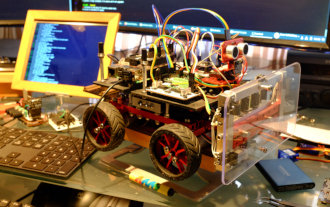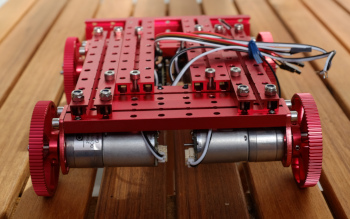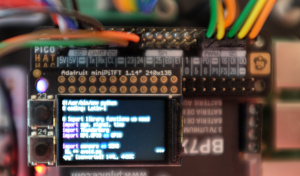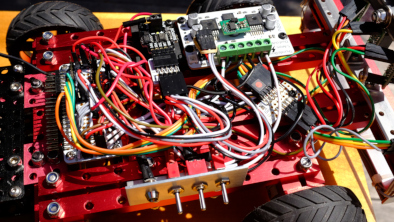KR01 Robot#
 |
The KR01 Robot is a small robot inspired by David P. Anderson's SR04 robot. There's a series of articles describing the KR01 robot on the NZPRG blog, see The KR01 Robot Project .
.
The cost of this robot is likely too high to be considered as a prototype for the NZPRG (though it'd be possible to reduce costs, see below), so I'm also designing several other lower-cost robot prototypes.
(you can click to enlarge images on this page)
Requirements#
 |
The following requirements are modeled upon David Anderson's SR04 robot:
- to be able to navigate and survive in a normal (cluttered) household environment, without getting stuck
- to provide a robust and reliable platform for developing navigation and behavior software
- be entertaining, aesthetically-pleasing, and inspiring for the local human population
Additionally, it is meant to explore Murray's Thesis, which requires the development of a multi-threaded Python robot controller that includes a PID Controller, ultrasonic , LiDAR, IR and bumper sensor behaviours. Can it somehow learn?
Specifications#
 |
- Raspberry Pi 3 B+
- OSEPP Tank Kit chassis with either silicon tank treads or four silicon tires
- four OSEPP 9.0 volt 185 RPM motors with 1:45 gear ratio and hall effect motor encoders
- uses a PiBorg Thunderborg
 Dual 5A Motor Controller with DC/DC & RGB LED for its motor controller
Dual 5A Motor Controller with DC/DC & RGB LED for its motor controller
- three front infrared sensors
- front bumper with polycarbonate plastic bumper with three-way subminiature lever switches
- infrared motion detector
- microwave motion detector (goes through walls)
- time of flight laser distance sensor (up to 4m with 25mm accuracy)
- ICM20948 9DoF Motion Sensor, including 3 axis accelerometer, 3-axis gyroscope, 3-axis compass
Current Weight#
- chassis (including motor controller, SSD, motors, and bumper assembly): 1.4kg
- main board (including Raspberry Pi and all upper sensors): 400g
- battery:
- Makita 18V 3.0Ah: 730g
- Makita 18V 1.5Ah: 475g
- Makita 12V 1.5Ah: 210g
- Makita ADP05 clip: 125g (for use with 18V batteries)
Typical weight with 18V 3Ah battery: 2.6kg
Chassis#
 |
The chassis currently uses a Pimoroni HT0740 40V / 10A Switch Breakout to control power to the sensors, so that the robot can go into a "low power" mode. There is a manual bypass switch in order to use the sensors without the 10A switch control.
to control power to the sensors, so that the robot can go into a "low power" mode. There is a manual bypass switch in order to use the sensors without the 10A switch control.
The bumper assembly mounts to the front of the chassis, and includes six subminiature lever switches (wired as three), to detect port, center and starboard bumps. It also has three 15cm infrared sensors that look through the polycarbonate plastic of the bumper. The center sensor is slightly offset (as it tends to see itself in the mirror and just stays on).
The aft board is a Adafruit Perma Proto Bonnet, a PC board designed to fit on top of a Raspberry Pi Zero, here repurposed to provide dual header pins to provide connections to the upper board (see KR 01 Wiring Notes).
Minimal Option#
The KR04 has a lot of features, and therefore costs. The current expenditures, which includes sensors, components and hardware that may possibly not even get used (hey! it's an experiment), is probably nearing NZ$1000.
If you wanted to get started on a lower budget you could begin with the basic OSEPP Tank Kit, some kind of robot controller (an Arduino, Raspberry Pi, whatever), a motor controller (RobotShop has some dual motor controllers starting under US$5, with many on the market), and power the robot using a commonly-available USB battery. With a mechanical bumper made from lever switches it'd be possible to build this for under NZ$200.
Here's a start for around NZ$170:
- OSEPP Tank Kit
 : US$100 (RobotShop)
: US$100 (RobotShop)
- Raspberry Pi Zero W
 : US$10, AdaFruit
: US$10, AdaFruit
- Maker Drive H-Bridge Motor Driver for Beginner
 : US$3.73 (RobotShop)
: US$3.73 (RobotShop)
...you'd still need to add a battery, some sensors and miscellaneous parts. And of course, don't forget to include shipping costs in your budget!
Pages Tagged "KR01"#
Links#
- KR01 Wiring Notes
- The KR01 Robot Project
 NZPRG blog entry
NZPRG blog entry
